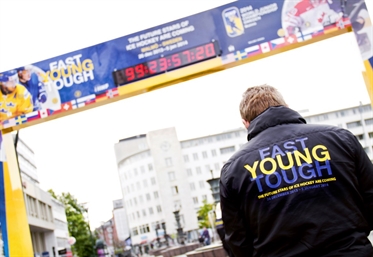Introducing Malmö
Introducing Malmö
Sweden’s southern city prepares to host World Juniors

 Fast, young, tough: Malmö is looking forward to the 2014 IIHF World Junior Championship. With 100 days left until the event, the countdown clock has been unveiled at Gustav Adolfs Torg. Photo: Fredrik Johansson / Malmö Tourism
Fast, young, tough: Malmö is looking forward to the 2014 IIHF World Junior Championship. With 100 days left until the event, the countdown clock has been unveiled at Gustav Adolfs Torg. Photo: Fredrik Johansson / Malmö Tourism
He became the GM of Malmö in 1995, and still calls the host city of the 2014 IIHF World Junior Championship his home.
Malmö’s hockey past is a chequered one, with the local team going up and down in the divisions, often with creative financial planning in the background. Latest version of that was having their import players live in Copenhagen, only a bridge away from Malmö, so they would get preferential tax treatment.
Also, the local soccer team, Malmö FF, has won seventeen league championships and fourteen cup titles in its 103-year history, and can also boast with being the alma mater of Zlatan Ibrahimovic, one of the best football players in the world today.
But, Svensson says, Malmö is a hockey town, too.
“You hear often people say that there’s no hockey culture in Malmö, but that’s not really true. The local team played in the highest league already in the late 1950s,” he says.
Back then, called Division I, the Swedish highest league had two groups of eight, and they played a home-and-away round robin. Malmö FF, still under the same umbrella with the soccer team, won just one if its 14 games, finished last in the Southern group and was relegated to Division II after the season.
Malmö was back in the top division in 1964-66, but was relegated again, and by the time it made it back to the top division, it had become “Elitserien”, and it was 1990.
“Things turned around when (building tycoon) Percy Nilsson took over. They won the title in 1992, and in 1994,” says Svensson.
Continue readingThese days, Malmö is back in the second division, trying to fight its way back to the top. Meanwhile, the league has changed its name again, now to Swedish Hockey League.
“You can’t talk your way up, you have to play your way up,” says Svensson.
And the team is trying to play their way up to the SHL in one of the nicest arenas in Europe. Malmö Arena, also one of the venues during the 2014 World Juniors, with a capacity of 12,500 spectators, opened in 2008.
“It’s one of the best arenas in Europe, with the arenas in Berlin, Cologne, and Helsinki. They’ve also renovated the old rink in which Canada and the U.S. will play their preliminary round games, and its capacity is now 5000,” says Svensson.
Malmö is one of the three big cities in Sweden, together with Stockholm and Gothenburg. Even though it’s smaller than the other two, with a population of about 300 000 - behind Gothenburg’s 900 000 and Stockholm’s 1,4 million - it’s the hub of Scania, the southern-most region of Sweden.
“I think about 25 percent of Sweden’s population lives in Scania, and Copenhagen is just 20 kilometres away from here thanks to the Öresund bridge, and there’s another 1,5 million people there,” Svensson says.
Hockey in Sweden has been a tough sell for the Danes, though.
“They have tried to get the Danes to come over, but with little success. Their local teams have small, but loyal attendances. The ones who come, want to mostly see the arena,” says Svensson.
And yet, Svensson believes the World Juniors has all the makings of a success.
“You can already tell that there will be a World Juniors tournament in town, they advertise it around the city. If Sweden makes it to the semi-final, well, they might pack the arena,” he says.
Back to Overview































































